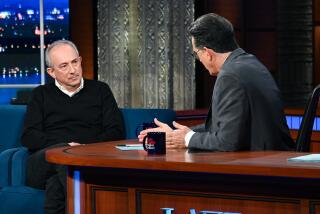Kaavya’s so not happy ending
KAAVYA VISWANATHAN has had a really, really bad week. I don’t mean the kind of bad week where you’re totally PMSing and then your boyfriend dumps you for some unthreatening slut who takes remedial chemistry. I’m talking really bad.
Kaavya’s this girl with awesome grades and parents who were obsessed about her getting into Harvard. They even hired a college admissions consultant, which lots of parents do these days. This consultant reads some of Kaavya’s writing, which happened to be about a girl whose parents want her to get into Harvard so badly that she never has any fun. The consultant sends it to a big agent, who sells it to a book packager, who makes a deal with a big publisher.
The book is called “How Opal Mehta Got Kissed, Got Wild, and Got a Life.” And Kaavya, just 17 at the time, gets close to $500,000 for a two-book contract. She also gets a movie deal with DreamWorks. Oh, and she gets into Harvard too. How psyched is she?
So a few years go by and her book finally comes out (and they print 100,000 copies, which is a lot). You’d think this would be the best thing that ever happened to her but, in fact, this is when Kaavya’s life starts to tank.
Last week, the Harvard Crimson runs a story saying she allegedly copied several passages from two books, “Sloppy Firsts” and “Second Helpings,” by author Megan McCafferty. By the next day, the story is all over the media, and McCafferty’s publisher finds more than 40 passages in “Opal Mehta” that are scarily similar to McCafferty’s work.
Now, Kaavya totally does not seem like the kind of person to do something like that. She goes to Harvard! But the weird thing is that “Sloppy Firsts” and “Second Helpings” happen to be two of her favorite books ever. McCafferty, who had to wait until she was 28 to get a book published, was hugely inspiring to Kaavya when Kaavya was growing up. When Kaavya goes on “The Today Show” to try to fix everything, Katie Couric is super harsh with her. Then on Thursday her publisher pulls “Opal” off bookstore shelves. Oh. My. God.
Long story short, Kaavya must be massively freaking out. Not only is the situation 1) totally embarrassing but 2) she’s now not even sure herself how this happened. She says that “any phrasing similarities were unintentional and unconscious.... I wasn’t aware of how much I may have internalized Ms. McCafferty’s words.”
In other words, it’s not that Kaavya was copying. It’s just that she was so influenced by these books that it was like McCafferty’s words became a part of her. It’s kind of like when you’re going out with a guy who’s really into surfing and then suddenly you’re all into surfing without meaning to be. But a lot of people think that’s majorly bogus. I mean, 1) only a total loser with no core self would accidentally get into surfing because of some guy and 2) can you really “unconsciously internalize” something and then accidentally copy it almost verbatim in your own book?
WHEN PEOPLE get accused of plagiarizing, they always have these really random explanations. Four years ago, the historian Doris Kearns Goodwin published “The Fitzgeralds and the Kennedys” and got busted for stealing stuff from Lynn McTaggart’s book about Kathleen Kennedy. In Time in 2002, Kearns Goodwin explained that “though my footnotes repeatedly cited Ms. McTaggart’s work, I failed to provide quotation marks for phrases that I had taken verbatim, having assumed that these phrases, drawn from my notes, were my words, not hers.” This other historian dude, Stephen Ambrose, is a quotation mark spaz, too. Even other fiction writers, like Jay McInerney, Alex Haley, Jack London and Nella Larson, have been accused of unconsciously internalizing the words of other writers.
So if it can happen to anyone, why are people bugging out so much about a kid? Aren’t adolescents’ frontal lobes -- the part of the brain that controls the ability to organize information (and maybe even moral judgment) -- less developed than adults’? Isn’t that why they call them “impressionable teens”?
Kaavya got her book deal when she was -- hello! -- 17 years old. As super smart as she is, the truth is she was and is still a teenager, and there’s a reason that teenagers usually aren’t professional writers. Sort of like the same reason they don’t perform surgery or fly jetliners.
It doesn’t help that publishers feel the need to compete with, say, “American Idol” and try to make people famous just because they’re young and potentially marketable. There’s a difference between a 17-year-old who sings an Avril Lavigne song on TV and one who is faced with the task of generating 314 pages that will be distributed and marketed all over the world.
Not that professional writers are all that, but published authors have to be more responsible than bloggers or MySpace types or clever e-mail writers. Sure, even though a few writers can be really good when they’re young -- Mary Shelley wrote “Frankenstein” when she was 19, but that was in 1816 when you weren’t always getting interrupted by text messages -- even the most meticulous of them aren’t really up to the task until they’re in their 20s or even really old, like in their 30s or 40s.
Yes, Kaavya messed up. But what about the domino effect caused by anxious parents, college counselors, agents and publishers who care more about marketing a phenom than upholding professional standards? These people really need to chill out and realize gymnasts and models might peak when they’re teenagers, but creative abilities, like boys, take a little longer to mature.
Oh, and maybe I’m tripping, but it seems to me the big winner is Megan McCafferty. And she didn’t even go to Harvard! Her publisher, Crown, a division of Random House, calls the whole thing “nothing less than an act of literary identity theft.” But the publicity is sure to generate a whole new crop of readers.
How psyched is she?
More to Read
Sign up for our Book Club newsletter
Get the latest news, events and more from the Los Angeles Times Book Club, and help us get L.A. reading and talking.
You may occasionally receive promotional content from the Los Angeles Times.








